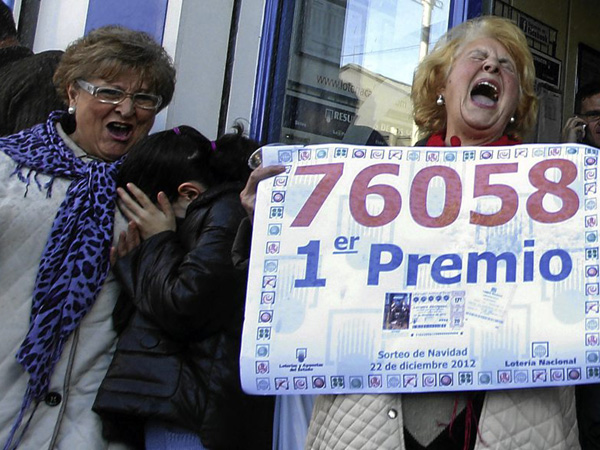
People celebrate after winning the first prize of Spain’s Christmas lottery named “El Gordo” (Fat One) in Granen, in Manises, near Valencia, on December 22, 2012. TOPSHOTS AFP / JOSE JORDAN
MADRID—Hundreds of fans of Spain’s annual Christmas lottery turned out to the draw on Saturday, some clad in wacky costumes and all hoping to win a piece of the pie and forget their economic woes.
Europe’s biggest lottery, the El Gordo or “The Fat One” will pay out a total of 2.47 billion euros ($3.25 billion) in prize money this year, down from 2.68 billion in 2011.
With the draw beamed live on television, the country held its collective breath when two schoolchildren sung out the winning number: 76058.
“This year again, I didn’t win, but that’s okay. We’re there with friends to have fun and clown around. It’s kind of a way to counter the crisis,” said Enrique Vilches, an 80-year-old retiree decked out in a clown costume.
Like many others, Vilches spent more than he would have liked on the lottery, whose tradition holds that anyone who is gifted a ticket must return the favour.
“I spent around 200 euros ($260) but if my wife knew that she’d kill me,” he said.
The couple share a 900-euro a month pension, which they also use to help out their grandchildren whose parents are unemployed like many in a country whose jobless rate is around 25 percent.
Spain’s economy—the eurozone’s fourth largest—is also in dire straits, with the government under pressure from the European Union to introduce billions in savings amid speculation that it might need to be bailed out.
On Thursday, Spanish lawmakers passed 39 billion euros’ worth of austerity measures, prompting fresh protests by demonstrators angry at cuts to pay and public services.
But while average spending on holiday festivities by Spanish households has dropped since the collapse of a housing boom in 2008, the lottery has suffered only fractionally from the crisis.
Its commercial director Juan Antonio Gallardo said ticket sales have fallen 3.5 percent since 2008 and this year “are similar or slightly lower” than in 2011.
“It is a tradition in Spain. It is in Spaniards’ DNA,” he said.
The draw, which is always on December 22, has been held since 1812 and is considered the kickoff to the Christmas season.
Instead of a single jackpot, the lottery is designed so that as many people as possible across Spain get a windfall in time for the holidays.
While residents spent eight percent less on the draw this year, they still dished out an average of 52 euros per person, down from 57 euros last year on tickets that cost 20 euros each.
“Now in a time of crisis is when the lottery is especially important. We play even more and hope to win something,” said 31-year-old Oscar Binon.
“People aren’t doing well in the crisis. But we haven’t lost hope,” said Rufino Huertas, a 55-year-old metro employee.
Clad in an outfit covered in “hand-made” pesetas—Spain’s currency before the euro took over in 2002—Huertas said: “Why the pesetas? Because life was better with the peseta.”
The government says the latest tough cuts are needed to fix public finances, but economists and non-governmental groups have warned the austere budget would undermine the recovery and worsen life for millions in Spain.